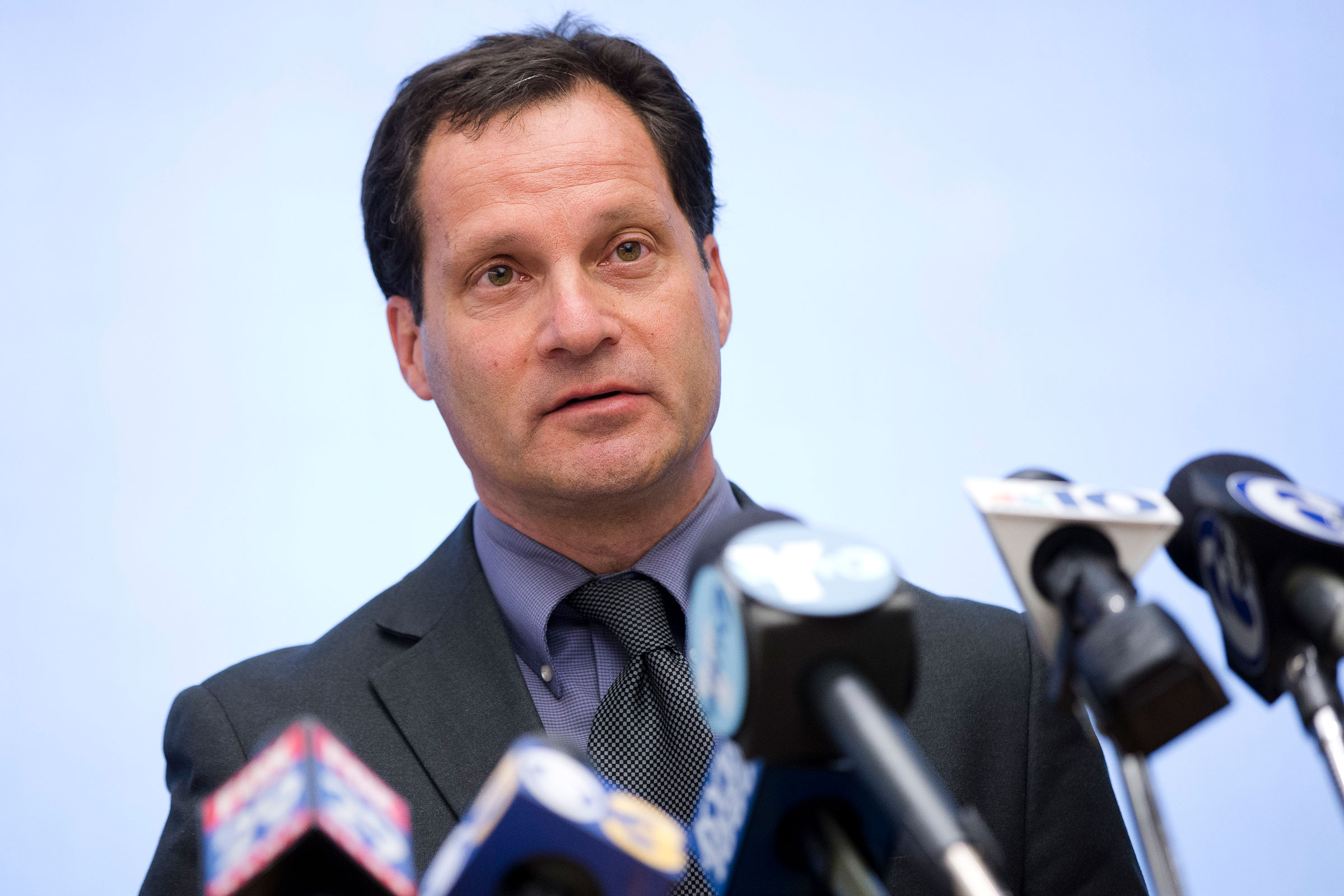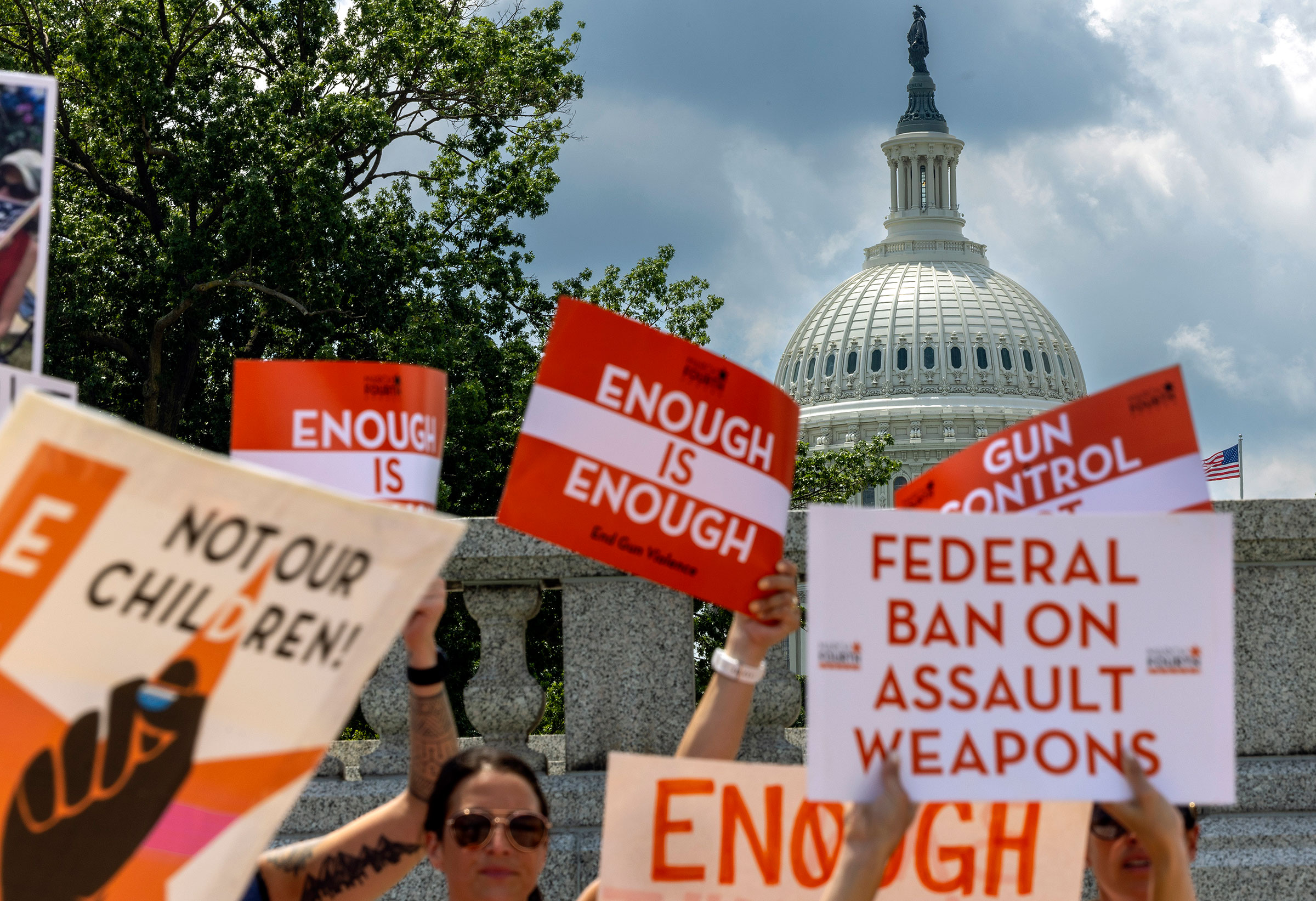Frustrated by years of political inaction in the U.S., gun control advocates have been reassessing their approach and coming up with increasingly innovative ways to force firearm companies to take more responsibility for gun violence. One of those people is Jonathan Lowy, the former chief legal counsel at the Brady Center to Prevent Gun Violence, who on Oct. 26 will announce the formation of a new lobbying group, Global Action on Gun Violence, focused on taking on gunmakers on behalf of foreign governments.
The group will partner with other countries to argue that their citizens are harmed by the actions of American gunmakers and the U.S. laws that protect them from litigation.
Lowy filed papers on Oct. 5 under the Foreign Agents Registration Act to provide legal and consulting services to the government of Mexico and plans to work with other nations on similar efforts.
“Litigation and other pressure and activity from the international community could well be the answer that we’re looking for to solve gun violence both in the United States and around the world,” Lowy tells TIME. “This is something that hasn’t really been tried.”

Lowy’s new mission comes as U.S. gunmaker profits reach all-time highs and as sales of AR-15 style semiautomatic weapons rise. Meanwhile, overall American support of stricter gun control has been rising in the wake of several mass shootings, but domestic efforts to hold gunmakers responsible through the legal system have not been particularly successful. That’s because the Supreme Court has largely struck down laws passed by cities and states attempting to regulate who can carry and purchase guns in America.
Some gun control advocates have pursued alternate efforts, such as buying up shares of gunmakers in an effort to bring about change from within the companies.
Lowy has already worked with the government of Mexico and lawyers in Canada to file three lawsuits against U.S. gunmakers in the last four years. In 2021, Mexico became the first country to sue U.S. gunmakers when it filed a lawsuit in U.S. District Court in Massachusetts contending that some of America’s biggest gun manufacturers, including Smith & Wesson, Barrett Firearms, Beretta U.S.A. Corp, Century International Arms, Colt’s Manufacturing Company, and Sturm, Ruger & Co., design, market, sell, and distribute guns in ways they know “routinely arm the drug cartels in Mexico.” (A Massachusetts judge dismissed the case in September but Mexico plans to appeal to the U.S. Court of Appeals for the First Circuit, which is based in Boston and which Mexican officials believe may be more sympathetic.) On Oct. 10 this year, Mexico filed a separate lawsuit in Arizona District Court against five Arizona gun dealers that it alleged “systematically participate in trafficking military-style weapons and ammunition to drug cartels in Mexico.” Some of the guns bought from U.S. dealers named in the complaint and smuggled across the border, Mexico alleges, were used in high-profile killings.
Lowy is also working as foreign legal counsel in a class action filed in Canada in 2019 against Smith & Wesson brought by victims of a mass shooting in Toronto who alleged that the company was negligent when it did not implement available safety measures in manufacturing the product. A judge allowed the case to go forward in 2021 and it is still being litigated.
Read More: The Inside History of How Guns Are Marketed and Sold in America
Lowy, who has litigated cases on gun violence since 1997, says that U.S. lawmakers and courts have largely rejected the argument that protecting human lives is more important than protecting the gun industry. “That’s a very controversial position in the United States—it’s one that’s been rejected by most policymakers and the Supreme Court in the United States to some degree,” he says. “But the rest of the world thinks that’s crazy.”
Mexico is not the only U.S. neighbor seeing an increase in guns crossing its borders, despite strict gun control laws. Jamaica, for instance, does not manufacture guns, but its population suffers from the effects of widely available guns, Prime Minister Andrew Holness argued while addressing the United Nations General Assembly in New York on Sept. 22. There, he called on countries that manufacture guns to “implement stronger measures” to ensure weapons don’t end up in the wrong hands. Jamaican authorities estimate that 200 guns are smuggled into the country from the U.S. each month.
In August 2022, the U.S. Department of Homeland Security said it had seen a “substantial” increase in the number of weapons and ammunition being illegally trafficked to Haiti and the Caribbean, as well as an increase in the caliber of firearms being trafficked. And in June, the president of the Dominican Republic, Luis Abinader, expressed concern about the large number of illegal guns in the country after officials seized a shipment of high-caliber rifles at one of its ports. Around 86% of handguns used in crimes in Toronto that were able to be traced were sourced from the U.S., according to testimony by Toronto Police Service Deputy Chief Myron Demkiw. “Our problem in Toronto [is] handguns from the United States,” he said.
The Mexican government has argued that U.S. gun manufacturers are largely responsible for the 200,000 guns that it says are smuggled into the country each year. Mexico has some of the strictest gun control laws in the world, according to the United Nations—it specifically prohibits citizens from possessing high-powered weapons and has only issued a few thousand handgun permits in the last decade. Despite this 70% of the 80,000 firearms recovered in Mexico between 2014 and 2018 came from the U.S., according to a 2021 report from the U.S. Government Accountability Office.
The argument over gunmakers’ responsibility
The Mexican legal complaints argue that U.S. gunmakers have a duty to carefully sell and distribute their guns, but that instead, they distribute to dealers that “recklessly or illegally” sell guns, and who frequently sell guns in bulk sales or to irresponsible buyers. There are methods the gunmakers could take to make their guns safer. In 2000, for instance, Smith & Wesson agreed to develop so-called “smart guns” that could only be fired by their owner in return for the withdrawal of lawsuits against the company brought by several states. After backlash from retailers that led to its CEO being ousted, the company ultimately dropped the plan. Mexico alleges that the company reneged on its promise.
The same types of guns used for mass shootings in the U.S. are often used by cartels in Mexico, says Alejandro Celorio Alcántara, the legal adviser of Mexico’s Ministry of Foreign Affairs. The genesis of the idea to sue U.S. gunmakers came after a 2019 shooting in an El Paso, Texas Walmart, where a 21-year-old man, allegedly targeting Latinos, killed 23 people after posting anti-immigrant messages online, Alcántara says. The suspect used a type of AK-47 imported from Romania by Century Arms, a defendant in the lawsuit filed by Mexico, he says. After that incident, Mexico’s Foreign Minister, Marcelo Ebrard, ordered his legal team “to find all legal actions available to hold these guys accountable,” Alcántara says. Mexico considered suing Century Arms, which imports firearms and modifies them for the U.S. market, but ultimately decided that pursuing legal claims against one firearm company would not be effective.
Instead, Mexico’s legal argument hinges on the idea that, as a country, it is harmed by the actions of numerous gunmakers because of the economic impact of gun violence.
Read More: How Gunmakers May Benefit From Mass Shootings
The government of Mexico had entertained the idea of suing gunmakers a decade or so ago, Alcántara says, but Lowy helped the current administration figure out how to make the case now.
The Mexican government is also putting diplomatic pressure on the U.S. government to step up gun control. The U.S. and Mexico has established a high-level security dialogue in which both countries committed to address illicit firearms, among other topics. The legal action is one more tool in Mexico’s toolbelt, Alcántara says. He and Lowy will both testify about the firearms industry’s corporate responsibility in the violation of human rights in Mexico on Oct. 25 at the Inter-American Commission on Human Rights.
“We’re doing a lot as governments, but the corporations are doing nothing,” Alcántara says.
Gun industry trade association the National Sports Shooting Foundation argues that Mexico’s lawsuit is “an affront to U.S. sovereignty” and also a threat to America’s Second-Amendment rights to keep and bear arms, according to a statement. Lawrence G. Keane, NSSF Senior Vice President and General Counsel, argues that the Mexican government is responsible for the crime within its borders, and that the Mexican government should focus on bringing cartels to justice, rather than on “scapegoating” American businesses. But there is nothing stopping foreign governments from pursuing companies in the U.S. courts. The U.S. Supreme Court has long held that foreign nations are entitled to prosecute civil claims in U.S. courts, just as a domestic business or individual might.
Victims of gun violence have previously tried to hold U.S. gunmakers accountable for where their products end up, but in recent years, they’ve been stymied by the Protection of Lawful Commerce in Arms Act (PLCAA), a 2005 law that protects gunmakers from litigation when their guns are used for the purpose for which they were designed. The novel approach that Mexico and Lowy are taking in their recent lawsuits attempts to get around PLCAA by arguing that, since the harm occurred outside of the U.S., the PLCAA should not apply.
Read More: When There’s Talk of Gun Control, Gunmakers Play the Jobs Card. They’re Often Bluffing
One of the only examples of gun control advocates getting around PLCAA was a recent settlement between Remington and the families of children killed at Sandy Hook Elementary School. While the ruling that the families could sue, despite PLCAA, was seen as a victory for gun control advocates, it was, ultimately, a settlement, rather than a court decision. That means that Remington did not admit liability and that other gunmakers will not be required to change how they distribute their weapons.
Preventing a ‘global’ gun violence epidemic
Mexico isn’t looking to settle. Its goal is to get gunmakers to change their distribution and monitoring systems, Alcántara says, which means it has to win its legal case, rather than agree to a settlement.
“If you asked me as the coordinator of the litigation, would you accept a settlement? No,” Alcántara says. “It is not that we want to keep fighting, right? But I want them to change their practices.”
But it could be a tall order. Even getting a U.S. judge to let the case proceed would be a big step, legal experts say, because it could force gunmakers to share closely-held information about how much they know about where their guns go.
Lowy argues that the lawsuits have already changed the tenor of the discussions about gun violence. No government wants to be seen as a pariah by the world, he says—even if it is the world’s largest economy.
Alcántara sees the outcome of the legal battle having potentially global implications. Without curbing the practices of the U.S. gun industry, he says, it’s not just firearms that will continue to find their way abroad, harming foreign citizens. The “extremist gun culture” that has permeated parts of the U.S. will also continue to spread around the world, he warns.
“It’s often been said the United States has a gun violence epidemic,” Lowy says. “It now has the potential to become a global pandemic if we don’t do something to stop it.”
- Donald Trump Is TIME's 2024 Person of the Year
- Why We Chose Trump as Person of the Year
- Is Intermittent Fasting Good or Bad for You?
- The 100 Must-Read Books of 2024
- The 20 Best Christmas TV Episodes
- Column: If Optimism Feels Ridiculous Now, Try Hope
- The Future of Climate Action Is Trade Policy
- Merle Bombardieri Is Helping People Make the Baby Decision
